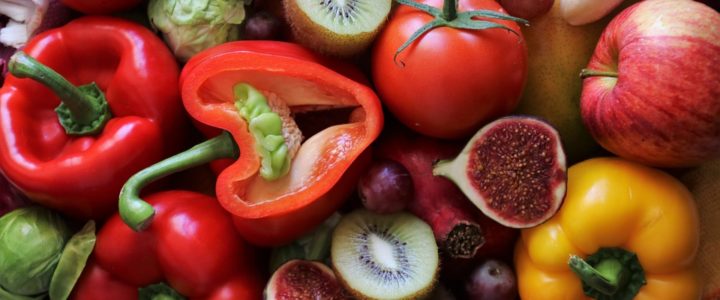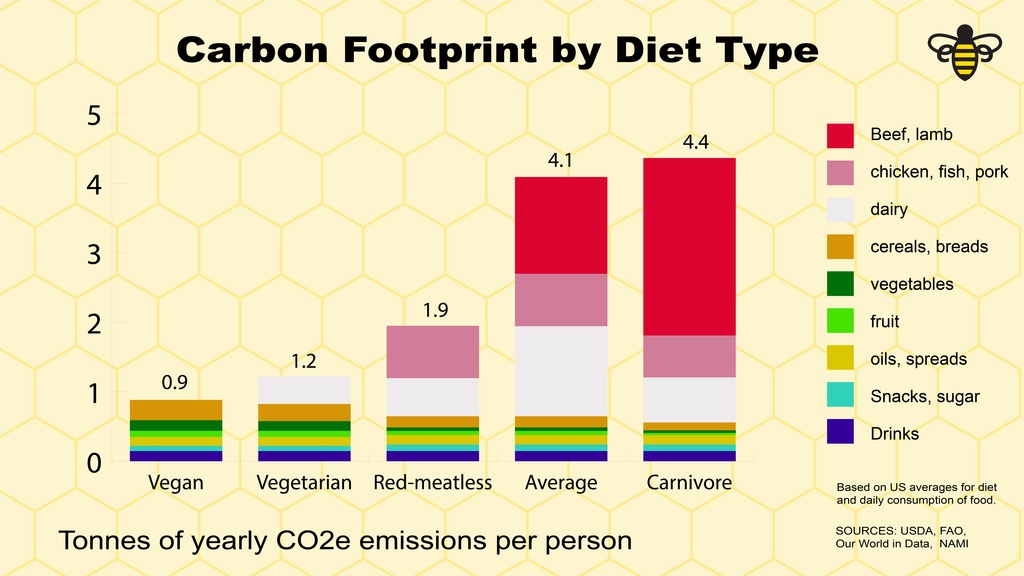
Does a vegan diet really help individuals eat more sustainably? The answer is actually more complex than a simple yes or no.
Eating a 100% plant-based diet does indeed help reduce your carbon footprint, since all animal products are avoided. A study from Oxford found that cutting meat and dairy products out of one’s diet could reduce one’s carbon footprint from food by up to 73%, and a study from Science found that meat and dairy production is responsible for 60% of agriculture’s greenhouse gas emissions. Another study published in Proceedings of National Academy of Science found that if everyone in the world went vegan in 2016, by 2050 the world’s food-related emissions would drop by 70%.
It’s clear that a hypothetical plant-based diet around the world would help reduce the carbon footprint of food drastically.
In addition to lowering the global carbon footprint, veganism would promote sustainability because less wild land would be lost to agriculture, which is one of the primary causes for the mass extinction of wildlife. In fact, a plant-based diet requires just one third of the land needed to support a meat and dairy diet. Another positive of eating plant-based is that lower quantities of water and crops are needed to sustain a vegan diet. It is also considered a more ethical diet. Many people are attracted to veganism’s ethical concerns of preventing the exploitation of animals. Since vegans do not consume livestock, they do not contribute to the industrialized processing associated with the livestock industry’s factory farms in which animals are raised in intensive confinement. Aquatic animals, in addition to nearly 10 billion land-based animals, are farmed for food each year in the United States in what is often argued as unacceptable and cruel conditions. For example, antibiotics are used to make animals grow faster and ensure they can survive in filthy conditions; and factory farm animals have been genetically manipulated to grow bigger or produce more milk or eggs than they normally would, which often causes these animals to die prematurely.

Veganism can certainly help individuals eat more sustainably and ethically, but did you know that a vegan diet can actually be harmful to environmental sustainability in some situations? For instance, in Finland many lakes are kept healthy by fishing practices that prevent overcrowding, which enables the consumption of fish to be environmentally sustainable for that region. Likewise, in some Arctic areas many plants cannot sustainably grow, so they must be transported over long distances for consumption, which makes nutritionally efficient foods like meat more sustainable in that region. These cases are important at a local level—not global. In other words, it’s important to look at sustainable complexities at local levels in food production and importation.
The importation of plant-based foods, which is often overlooked, undermines many vegan’s efforts at sustainability. A 2017 study from Italy showed, for instance, that two vegan participants had larger carbon impacts than meat eaters because they only ate imported fruit. Another interesting study from the University of Manchester highlighted the potentially large carbon footprint from some plant-based foods transported via air. It found that asparagus in the UK has the highest carbon footprint (5.3 kg of carbon dioxide for every kilogram of asparagus) compared to any other vegetable eaten in the country because it is largely imported from Peru.
Also, it is important to note that carbon emissions are produced not only from importation, but also consumption. For example, a study from The American Journal of Clinical Nutrition found that when meat and deli meat were replaced with the same caloric intake of fruits and vegetables, there was either an increase in greenhouse gas emissions or no effect. This is largely because a higher amount of plant-based substitutes need to be consumed to have the same nutritional intake as animal proteins.
Certain staple foods in a vegan diet can not only potentially produce larger carbon emissions, but also can contribute to deforestation as they can require vast amounts of water and land use. Soy is the second largest agriculture driver of deforestation after beef (although, it’s important to note that 98% of soybean meal is used for animal feed and only 1% is used to produce food for humans). Also, palm oil, which is found in a vast amount of packaged foods, is largely grown irresponsibly and is a another leading cause of deforestation. Other foods in the vegan diet need substantial amounts of water to produce; for instance, to produce one kilo of avocados require 2,000 liters of water and 15 gallons of water are needed to produce only 16 almonds. And demands for larger almond crops have other negative impacts including causing a high mortality rate among bees who pollinate the groves.
The graph below demonstrates the gallons of water used to produce 1 pound of animal-based food versus 1 pound of plant-based food, and this graph shows a downward trend in that less water is generally needed to produce plant-based products than animal-based products. Interestingly, lentils require more gallons (i.e. 58 pounds) of water than chicken to produce one pound of food.

It’s also important to note that plant-based foods and plant-based meat substitutes are not necessarily more nutritious than animal based foods. Nutritional deficiencies (e.g. B12, calcium, iron, and zinc deficiencies) can result from a strictly plant-based diet that does not take daily vitamin requirements into account. Many popular plant-based alternatives to animal products, such as the Beyond Burger and the Impossible Burger, are highly processed. For example, the Impossible Whopper at Burger King contains significantly more sodium than the regular Whopper and a myriad of other very processed ingredients including modified food starch, soy protein isolate, and cultured dextrose. Additionally, plant-based meat alternatives produce the same emissions as chicken, which is about five times that of legumes and vegetables, and soy has contributed to environmental degradation of the Amazon.
A sustainable vegan diet therefore requires knowledge of the carbon footprints and the production of locally grown food, as well as knowledge of nutritional requirements for a healthy lifestyle. Being a vegan and sticking to a strictly plant-based diet does not mean that one is automatically more sustainable or healthier than a meat or dairy eater, because plant-based foods can be nutritionally deficient, highly processed, and produce the same (if not more) emissions as animal products.
Overall, vegans do tend to have lower carbon, water, and ecological footprints than those of meat or fish eaters. Veganism supports the message that it is crucial to consider where our food comes from and how it is grown.

This graph shows the clear trend that diets which include eating animal products do produce more carbon emissions per person than plant-based diets do. The takeaway is that small eating changes to our diet, such as eating less meat or eating foods grown locally, can have drastic impacts to reducing our ecological footprint to the environment, but eating sustainably requires more thought than just eating plant-based. Thinking about how far our food has travelled, if foods are linked to deforestation, and how much water and grains are required to produce food are important to practicing sustainability.





Excellent article! Critical information, well delivered and professionally sourced. This committed vegan learned some things that are important to think about as we work to save our planet.
Thank you!So glad you found the article useful and can apply this information into your daily life.